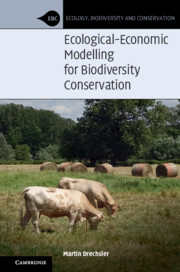Book contents
- Ecological-Economic Modelling for Biodiversity Conservation
- Ecology, Biodiversity and Conservation
- Ecological-Economic Modelling for Biodiversity Conservation
- Copyright page
- Contents
- Preface
- Acknowledgements
- Part I Modelling
- Part II Ecological Modelling
- 4 Homogenous Deterministic Population Models
- 5 Homogenous Stochastic Population Models
- 6 Spatial Population Models
- 7 Models with Individual Variability
- 8 Models of Biodiversity
- Part III Economic Modelling
- Part IV Ecological-Economic Modelling
- References
- Index
8 - Models of Biodiversity
from Part II - Ecological Modelling
Published online by Cambridge University Press: 29 February 2020
- Ecological-Economic Modelling for Biodiversity Conservation
- Ecology, Biodiversity and Conservation
- Ecological-Economic Modelling for Biodiversity Conservation
- Copyright page
- Contents
- Preface
- Acknowledgements
- Part I Modelling
- Part II Ecological Modelling
- 4 Homogenous Deterministic Population Models
- 5 Homogenous Stochastic Population Models
- 6 Spatial Population Models
- 7 Models with Individual Variability
- 8 Models of Biodiversity
- Part III Economic Modelling
- Part IV Ecological-Economic Modelling
- References
- Index
Summary
This chapter combines the modelling approaches of Chapters 4 – 7 to investigate how and why species can coexist. For this the chapter presents main arguments and concepts that have been presented in the literature over the past few decades, which include, among others, niche separation, the competition-colonisation trade-off and the intermediate disturbance hypothesis. Modelling examples from the literature that introduce and investigate these concepts are outlined. Some of the models are stochastic, most of them contain spatial structure and all of them, of course, consider individual variability, either through equation-based models or individual-based models. Various models, expecially the more recent ones contain all three features. Species coexistence is one of, or may be even the most, important question analysed in the research fields of (meta) community ecology.
Keywords
- Type
- Chapter
- Information
- Ecological-Economic Modelling for Biodiversity Conservation , pp. 98 - 108Publisher: Cambridge University PressPrint publication year: 2020

